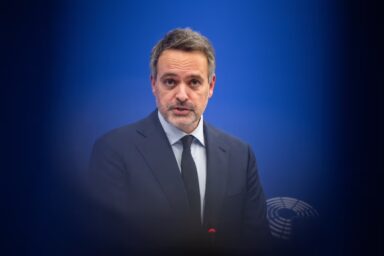The European Commission’s proposal for the new long-term budget includes record-level investments in research and innovation. Health organisations, however, worry that the billions may not do much to improve people’s health and lives.
The Commission proposes to expand Horizon Europe from €95.5bn to €175bn to fund digital health, AI, and other strategic technologies. But health experts stress the importance of channelling research funding toward pressing public health challenges. Without measurable links to outcomes, prevention and equity, the EU-funded scientific effort may never reach patients, health organisations say.
Prioritise unmet need and impact potential
“It is now of utmost importance for Horizon Europe to prioritise areas with the greatest unmet need and impact potential. Cardiovascular disease (CVD) should be an obvious priority,” the European Society of Cardiology (ESC) said in its July response.
Despite the CVD’s “economic burden exceeding the entire EU budget,” it does not enjoy a clear priority status in the €19.6bn health window or Horizon Europe 2.0. The CVD remains the leading cause of death in Europe. It is responsible for 34 per cent of all deaths, at the annual estimated cost of €282bn to the EU economy.

This gap sits at the heart of a growing concern: can patients benefit from cutting-edge science if their most basic needs remain underfunded?
Health in the broader MFF
The European Public Health Alliance (EPHA) warns the new MFF may prioritise markets over public health. This includes issues such as disease burden, equitable access, and health system readiness.
“Health must remain a strategic and cross-cutting priority for the European Union. Not simply a means to boost the competitiveness of the healthcare industry,” said Milka Sokolović, EPHA’s director general.
You might be interested
“We urgently need to place comprehensive health promotion and disease prevention at the centre of EU investment priorities,” added EPHA policy manager Sara Bertucci.
The European Heart Network (EHN) echoed this message, warning that “health is a fundamental human right and shared societal value. Not a commodity to be leveraged for economic gain.”
Prevention: Europe’s smartest investment
EPHA insists that the EU put prevention and health promotion at the heart of its research budget. In their MFF response, the organisation called for a shift toward addressing the root causes of ill health. Not only as a public good but as an economic imperative.
“To prepare for future crises, reduce costs and pressure on society and healthcare systems, the EU must double down on prevention,” EPHA wrote. “Chronic disease, health inequities, and growing health challenges linked to an ageing and sicker society and planet will not be solved by industrial competitiveness and efficiency gains alone.”
It is now of utmost importance for Horizon Europe to prioritise areas with the greatest unmet need and impact potential. – The European Society of Cardiology (ESC)
Ms Bertucci reinforced that message: “That means funding cross-sectoral action to tackle the root causes of ill-health, from poverty and harmful products to pollution and climate breakdown. Keeping people healthy is fair, smart, and cost-effective.”
EPHA argues that focusing on prevention would not only deliver better health outcomes across the EU. It would also reduce long-term costs and help protect Europe’s human capital in the face of future shocks. Yet they warn the current MFF draft risks sidelining this logic in favour of industrial and competitiveness goals.
Research independence at risk
EU-LIFE, an alliance of leading research centres in life sciences, welcomed the increased research budget. But it warned that the proposed structure risks diluting its impact. Although it enjoys a standalone status, Horizon Europe 2.0’s close ties to the new European Competitiveness Fund (ECF) raise concerns among researchers.
“Although an increase in absolute numbers, it remains less than 10 per cent of the whole Multiannual Financial Framework. And it is still far from the broadly supported minimum of the €200bn leading independent experts propose, along with the research and innovation sector,” EU-LIFE noted. The researchers cautioned against subordinating Horizon Europe to the ECF, arguing this would weaken its ability to support independent science and respond to public health needs.
They also cited risks to scientific quality, including threats to the European Research Council’s autonomous governance, limited support for early-stage research, and vague definitions of ‘open’ calls that may restrict investigator-led science.
These risks, EU-LIFE argued, jeopardise the potential of Horizon Europe to deliver transformative innovations that address major health and societal challenges.
Health’s strategic role
EHN further warned that “the proposed absorption of EU4Health into an umbrella fund with broader industrial priorities risks diverting essential resources away from these critical public health priorities and undermining the EU’s capacity to act decisively on health in general and cardiovascular health in particular.”
The European Federation of Pharmaceutical Industries and Associations (EFPIA) highlights what it perceives as the weak prioritisation of health innovation. “We do not believe that the health and health research innovation have been sufficiently prioritised despite their strategic importance for Europe’s competitiveness and security,” the group stated.
The EU must double down on prevention. – European Public Health Alliance
EFPIA called on the EU “to increase and ringfence funding for health and health research and all essential pillars of a competitive life science innovation ecosystem (digital health infrastructures, multi-country clinical trial networks, and regulatory networks capacity, health systems’ preparedness for new health solutions).
Beyond numbers
As the MFF negotiations begin, health stakeholders will be watching closely to ensure that the final framework not only boosts innovation, but translates into healthier lives, in Europe and beyond. With the future of public health, prevention, and global equity at stake, they are calling for funding commitments that go beyond numbers and deliver meaningful impact.
The EHN added that the EU must uphold its legal mandate under Article 168 of the Treaty on the Functioning of the European Union, ensuring to gurantee a high level of human health protection across all policies.










